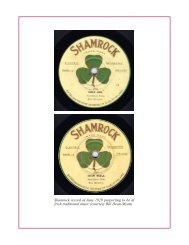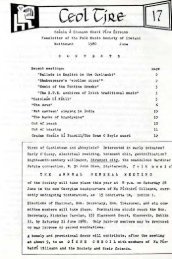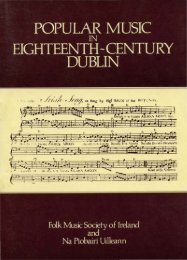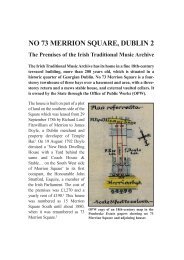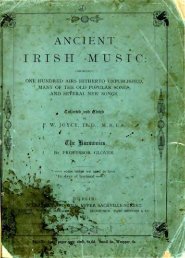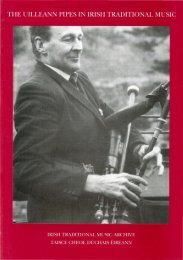Union Pipes - Irish Traditional Music Archive
Union Pipes - Irish Traditional Music Archive
Union Pipes - Irish Traditional Music Archive
Create successful ePaper yourself
Turn your PDF publications into a flip-book with our unique Google optimized e-Paper software.
COURTNEY’S ‘UNION PIPES’ AND THE TERMINOLOGY OF IRISH BELLOWS-BLOWN BAGPIPES 58<br />
decline in Ireland. The word ‘union’ shrank in meaning there to<br />
become only a shorthand reference to the hated ‘<strong>Union</strong>’, and for<br />
many years in the mid-nineteenth century the leading Catholic<br />
politician Daniel O’Connell led a national movement for the repeal<br />
of the <strong>Union</strong>. It has never been explained what the connection of the<br />
Act to the musical instrument could have been, but at any rate, as has<br />
been seen, the term was in existence some dozen years before the<br />
Act was passed, and it was introduced in another country. The idea<br />
of political union was of course in public debate for some years<br />
before the passing of the Act, but it was not very actively promoted<br />
as early as 1788. 164 This proposed derivation of the term can<br />
therefore be dismissed as spurious. However, after the passing of the<br />
Act, this meaning was implied for political purposes at least once, in<br />
Scotland in 1806, and in connection with an <strong>Irish</strong> piper Richard<br />
Fitzmaurice:<br />
The Scots Society, in honour of St Andrew, held... their<br />
anniversary meeting, in the London Tavern, Bishopsgate-street<br />
164<br />
In fact the term ‘union pipes’ was so well established by the time of the Act<br />
of <strong>Union</strong> debate that it was used for political purposes in some satirical sheets<br />
published by the anti-<strong>Union</strong> side in Dublin in 1799: ‘Sir Pertinax Platter...<br />
though an hon. Gentleman had talked of <strong>Union</strong> <strong>Pipes</strong> in allusion to him, he was<br />
not sufficiently skilled in concert music to be able to understand...’ (Proceedings<br />
and Debate of the Parliament of Pimlico, in the Last Session of the Eighteenth<br />
Century. No. 1); ‘At the Royal Circus, near College-Green [the <strong>Irish</strong> parliament<br />
building]... January 15... After the Pantomime, a favourite Concerto on the<br />
<strong>Union</strong> <strong>Pipes</strong>, By Mr. Corelli...’ (poster). Similarly an American newspaper of<br />
the period used the term to make a political point about Ireland: ‘In the new<br />
pantomime at Covent Garden Theatre, the <strong>Irish</strong> Harp and the <strong>Union</strong> <strong>Pipes</strong><br />
played in concert. We should be glad to find our Hibernian brethren inclined to<br />
such National Harmony.’ (Daily Advertiser, New York, 25 June 1799). The<br />
term had an even wider political application: ‘A transparency in a street in St.<br />
Ann’s Parish [London], represented Mr. Pitt, the First Consul of France, Mr.<br />
Windham, and Joseph Bonaparte, dancing a Fandango, to a tune played on<br />
<strong>Union</strong> Bagpipes. John Bull appeared in a corner, with a purse in his hand, ready<br />
to pay the piper.’ (Morning Chronicle, London, 16 Oct. 1801).



